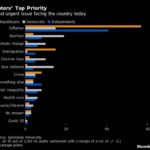
(Bloomberg) — A pair of incumbent governors thought to have eyes on the White House — Republican Ron DeSantis in Florida and Democrat Gavin Newsom in California — both handily won re-election Tuesday, giving their parties a glimpse into the future on a night when statehouse executives generally held off their challengers.
Most Read from Bloomberg
Along with DeSantis and Newsom, New York’s first female governor, Kathy Hochul, won election to a full term. Republicans in Texas and Georgia also emerged victorious, as did Democrats in Illinois and Connecticut. Two states — Maryland and Massachusetts — traded moderate Republican governors for pioneering Democratic contenders.
Some races still hung in the balance — including Arizona, where Republican Kari Lake, a vocal 2020 election denier with support from former president Donald Trump, is running against Democrat Katie Hobbs.
Oregon’s all mail-in balloting meant the state would have to wait to find out if it would have its first Republican governor in 20 years.
But the night’s gubernatorial headliners were DeSantis and Newsom, two men who have sparred coast-to-coast as they position themselves for possible presidential runs in 2024.
DeSantis beat Democratic challenger Charlie Crist by 60% to 40% in the Florida, according to the Associated Press. In California, Newsom easily defeated his Republican challenger, Brian Dahle, to win a second term.
DeSantis, 44, hasn’t said he plans to run in 2024 and avoided questions about the presidential race during his debate with Crist. Still, he has constantly popped up in polls as GOP voters’ preferred standard-bearer should Trump decide against making another run. DeSantis has also secured the support of big-ticket donors, including billionaire Ken Griffin, the founder of Citadel.
Newsom, 55, largely ignored his opponent and instead spent much of his campaign building his national profile and promoting progressive causes. That has fueled speculation that he is considering a presidential run, though he has repeatedly denied interest.
The races were among 36 gubernatorial contests across the US Tuesday. They’ve taken on added significance this year after the Supreme Court put the issue of abortion in the hands of state governments and limited what they can do to regulate guns. Those topics were front and center in Texas and Georgia, where incumbents Greg Abbott and Brian Kemp won.
In Democratic-led states, candidates also fared well. In New York, Hochul held off a surprisingly tough challenge from Republican Lee Zeldin in a race that focused heavily on crime in the closing days. In Illinois, Democratic billionaire J.B. Pritzker won his re-election as expected, beating Trump-backed Republican opponent Darren Bailey. In Connecticut, incumbent Ned Lamont won.
NY Governor Hochul Beats Zeldin in Close Race Dominated by Crime
‘Begun to Fight’
Back in Florida, DeSantis thanked voters for what he called a “historic, landslide victory” in a speech in Tampa. He didn’t mention Trump or speculation that he will run for president, but he did say, “I have only begun to fight.”
Trump escalated his rivalry with DeSantis, warning that he would expose damaging information if the Florida governor were to challenge him for the Republican presidential nomination.
“If he runs, he could hurt himself very badly,” Trump said in an interview with Fox News and other outlets. “I would tell you things about him that won’t be very flattering — I know more about him than anybody, other than, perhaps, his wife.”
DeSantis’s victory is also a win for the conservative, headline-grabbing brand of politics he carried out during his first term. The Republican incumbent won the important Latino vote in Florida, according to exit polls conducted by CBS News that found 56% of Latinos voted for DeSantis. The number represents a big swing in Hispanic support toward Florida Republicans over the last four to six years. DeSantis lost the Latino vote in his previous election.
He clashed with President Joe Biden over vaccine and mask mandates, blasting him for establishing a “biomedical security state.” He then shifted his focus to culture-war issues, especially a law limiting school instruction about gender identity. A couple of months ago, he used taxpayers’ dollars to fly dozens of Venezuelan migrants from Texas to Martha’s Vineyard, Massachusetts.
The strategy was key in raising DeSantis’s profile as a potential Republican presidential candidate. Trump has teased for months that he plans to run again in 2024, and while he’s still the favored pick among GOP voters, his political baggage and legal troubles could prove an obstacle for another run.
Abbott, Kemp Win
Abbott beat Democratic candidate Beto O’Rourke to win re-election for a third term as governor of Texas, signaling voters approved of his hardline conservative views.
Abbott was favored to win, with polls showing the incumbent having anywhere from a five to 11 percentage point lead. The results suggest Texans still trust Abbott to lead the state on issues like immigration and the economy — the top concerns among voters. Abbott’s stances favoring a ban on abortions with very few exceptions and loose gun policies were popular with his base.
Abbott’s healthy margin of victory may empower GOP lawmakers to take a more rightward slant in their policy proposals. During his campaign, Abbott spoke frequently about strengthening border security and providing property tax relief, which are two areas likely to be a focal point in next year’s session.
In Georgia, Republican Governor Kemp easily won re-election, fending off voting-rights organizer Stacey Abrams for a second time and cementing the power of the state’s GOP-dominated legislature.
Kemp, 59, won 54% of the vote to the Democrat’s 45% in unofficial AP results, more than quadrupling his victory margin over Abrams in 2018.
The rematch between Abrams, 48, and Kemp was one of the most closely watched races in the US, in large part because of Abrams’s national stature as a voting activist and her role in delivering Georgia to Democrats in 2020 and 2021.
Whitmer Wins
Michigan’s Democratic Governor Gretchen Whitmer won-relection against Republican Tudor Dixon.
In Illinois, Pritzker, 57, campaigned on his support for abortion rights and improvements in state finances and had led in the polls in a state largely controlled by Democrats.
Heir to the Hyatt hotel fortune, Pritzker contributed more than $100 million of his own money to campaign against Bailey, a state senator and anti-abortion downstate farmer who ran on concerns about rising crime, property taxes and the economy.
In Massachusetts, Attorney General Maura Healey sailed to victory, defeating Republican rival Geoffrey Diehl, who was backed by Trump. The 51-year-old Democrat vowed to become the nation’s most aggressive governor on climate change, and to help the state develop a “climate corridor” for innovative green technology. Her plans include appointing a cabinet-level climate czar and spurring the installation of 1 million heat pumps statewide by 2030.
She’s also making history as the state’s first woman to be elected governor.
In Maryland, Democratic nominee Wes Moore defeated Republican and election denier Dan Cox, making him the first Black governor of the state. Moore, a Rhodes Scholar who served in combat in Afghanistan, is the former chief executive officer of the Robin Hood Foundation, an organization that fights poverty in New York City and is backed by many on Wall Street.
Sarah Huckabee Sanders, the former White House press secretary during the Trump presidency, won the governorship in Arkansas. Republican Governor Kevin Stitt won re-election in Oklahoma, defeating Democrat Joy Hofmeister, a former Republican and the state’s superintendent of public instruction.
–With assistance from Christian Hall, Margaret Newkirk, Airielle Lowe, Zach C. Cohen, Gregory Korte, Shruti Date Singh, Tarso Veloso, Alyce Andres, Brendan Walsh, Keshia Clukey, Emma Court, Amanda Albright, Karen Breslau, Tiffany Stecker, Ryan Teague Beckwith, Jack Gillum and Felipe Marques.
(A previous version of this story corrected the spelling of Florida in the sixth paragraph.)
Most Read from Bloomberg Businessweek
©2022 Bloomberg L.P.




